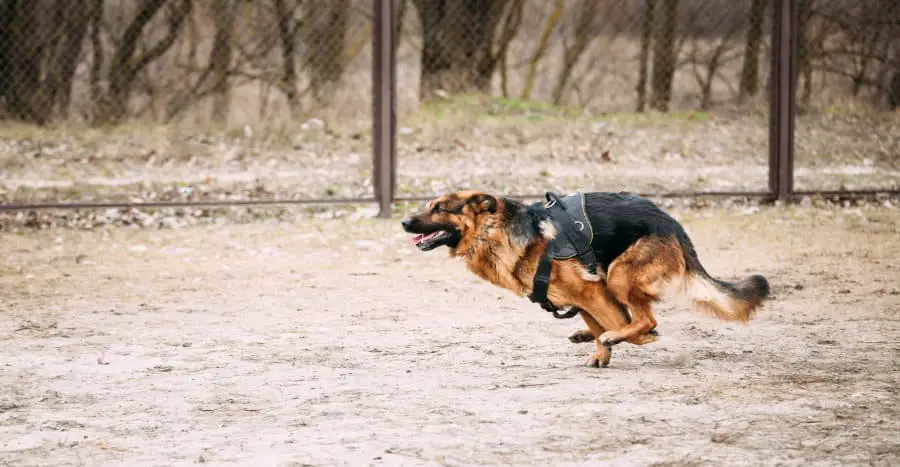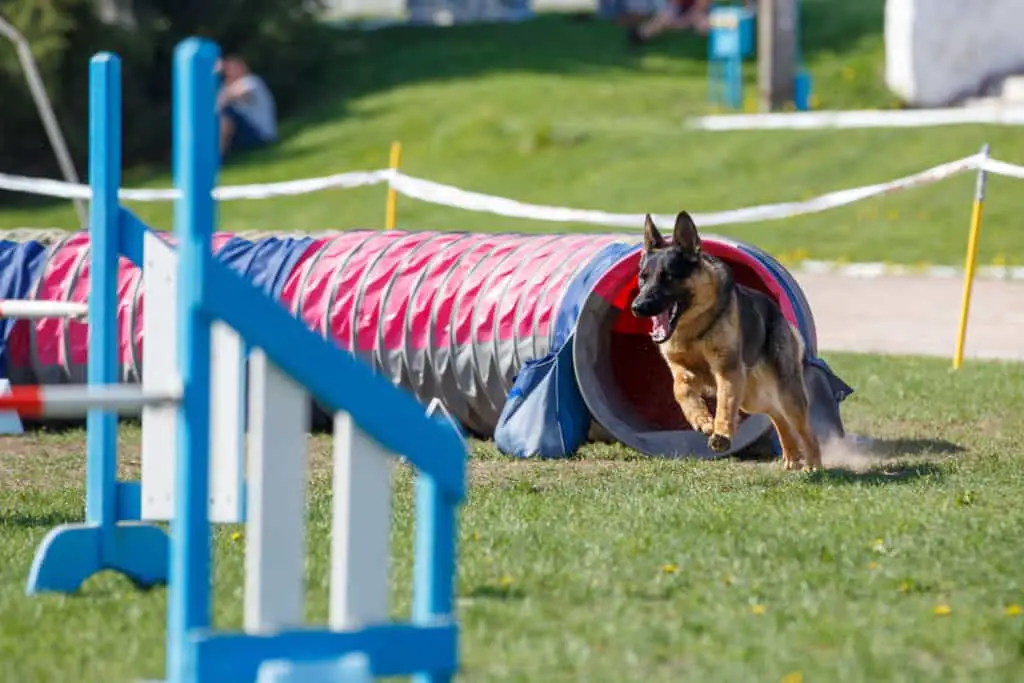German Shepherds are amazing dogs and are one of the fastest dog breeds in the world. A German Shepherd can be faster than the fastest man in the world (Usain Bolt holds the record for the fastest 100m dash, he ran it in 9.58 seconds). While most German Shepherds are big and quite heavy, they still are able to run at surprisingly fast speeds.
How fast can a German Shepherd run 100 meters? A German Shepherd can run 100 meters in approximately 7.4 seconds. That’s an average top speed of 30 mph. There are many factors that can contribute to this time, such as:
- A flexible spine
- Powerful leg muscles
- A long loin
- And the double-suspension gallop
There are other variables that can help maximize the overall speed of a German Shepherd. Therefore, it is important to how to train your German Shepherd for runs, and how to take care of its muscles.

Why Are German Shepherds So Fast?
Dogs are naturally faster than humans. However, German Shepherds are among the fastest dog breeds. Not only are they aesthetically pleasing, but their body composition is perfect for running.
Here are the following causes that allow for German Shepherds to be great runners:
- Body Parts: The lengths of their loins and legs attribute to their forward stride, and their paw pads help maximize the grip.
- Metabolism: Dogs have a higher metabolism that allows their blood to pump faster, and this leads to them breathing harder and faster. The more air they can take in, the longer they can run.
- The Gallop: As their back arches and extends, their hind legs can overreach their front legs, propelling the German Shepherd forward at great speeds.
German Shepherds are considered endurance runners. They can reach speeds of up to 30 mph and can keep steady speeds for long periods of time or for several 100-meter dashes.
It is not recommended to start training your puppy until it’s at least 18 months old, because their bones are not fully developed. However, you can start to train them on basic commands, so when the time comes for training, they will listen to you better.
In order to reach their top speed, one must understand what it takes to train a German Shepherd.
Training Your German Shepherd
German Shepherds are known for their intelligence and their ability to follow commands. To have your German Shepherd reach their full running speed you need to train them often.
If you want to have your German Shepherd run multiple 100-meter dashes, then you will need to train them for a couple of hours a day. This type of training builds up their tolerance and stamina. They will begin to handle these 100-meters, as well as longer training days.
If your German Shepherd needs a bit of motivation to start running, it is best to start them slow and gradually have them jog with you. You can have them run with a leash or without it, only if you feel comfortable.
As you start your training, you may walk with your dog for 5 minutes and then jog with them for 5 minutes for the first week. The following week, start by walking for 5 minutes and then jogging for 10 minutes. It may not sound like much, but little by little you can increase the distance and your dog will be able to run with better endurance.
After you get a feel for their speed, you can start to push your routes further. Once you’ve consistently reached a point where you can take your German Shepherd for a 2-mile run, this may take under 30 minutes, you could then increase the distance even more, add obstacles or add an extra work out day to their routine.

It is important to understand when and how to care for your German Shepherd during their training for the 100-meter dash in order to avoid injuries.
- Hip Dysplasia: This injury happens to most German Shepherds as they are usually worked harder. Their hind legs may start to become stiff or they may stop using the leg that hurts. Watch out for their joints when they are running and jumping.
- Geographical Terrain: Their paw pads need to be comfortable with the ground they are on. If you have them run on the hot sidewalk, they may veer off onto the grass to make it more comfortable. Try to walk them on something soft like dirt.
- Hot and Cold Weather: German Shepherds have two coats, and this can either be a good or a bad thing. If you are overexerting them during hotter months, they can collapse from the heat. It would be better to monitor and lessen the workouts until the colder months.
As you are running with your German Shepherd, look out for any eye contact. They will use this eye contact to see where your head is. You can use this moment to gauge how they are doing and if you need to stop.
You may also want to bring in warm ups and cool downs for them. Warm ups loosen your pet’s muscles and lessens their chance of an injury. Cool downs are meant to bring their heart rate down and you can achieve this by doing a light walk.
Taking Care Of Your German Shepherd’s Muscles
While training your German Shepherd you should be wary of any signs of exhaustion. If you train your German Shepherd too much, their muscles can become sore and stiff.
As you are training your German Shepherd, make sure that they receive proper care and attention. Bring water and treats during your training sessions and be patient.
Pushing your German Shepherd too hard will result in them refusing to work with you. They may even start to overheat. Realize that there are some days that you should not train your pet, as they need rest just as humans do.
If your pet does any of the following, these are signs that you should suspend training for a day or two to allow for proper rest:
- Ignoring Commands
- Panting Harder Than Ever
- Lays Down No Matter What
- Attacks Their Water Bowl
- Jogging Behind You Instead of with You
- Walking Slowly Towards You
Taking breaks with your German Shepherd during their training can prove to work wonders. Your pet can relieve themselves or drink plenty of water. This can help to recalibrate them and help put them back in the mindset of finishing their training.
Bring your German Shepherd to the veterinarian if you suspect that there is anything wrong with your pet after a training session. They are able to run the necessary tests to determine the state of your dog’s health.
German Shepherds are capable of running 100-meters in 7.4 seconds, with enough training and discipline. Along the way, they will need a patient hand and guidance. Understand what could happen to them if you train them too hard and apply that to their routine. You want to make sure that they are strong, safe and healthy enough to complete the task.
Source: American Kennel Club
